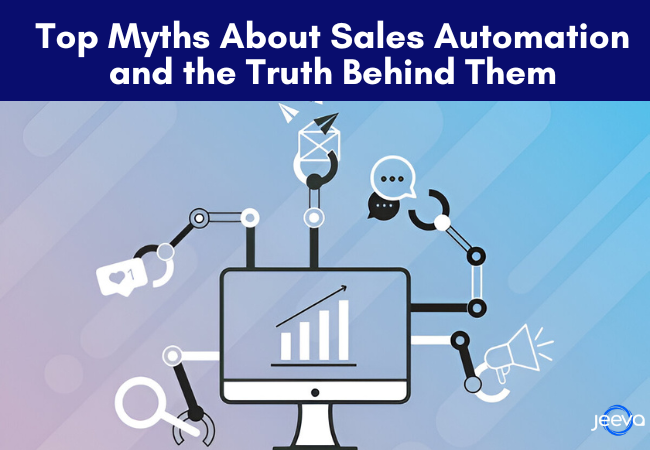Myths About Sales Automation You Need to Know (and the Truth Behind Them)
The world of sales has undergone significant transformation over the years. The advent of high end sales tools and platforms have simplified sales operations for many. From personalized outreach to lead enrichment, sales and marketing automation tools can handle it all. This has allowed businesses to operate hassle-free while helping them save a fortune on additional resources. The integration of AI in sales has further brought about positive changes in the sales and marketing dynamics, irrespective of the industry domains served.
According to McKinsey & Company, early adopters of sales automation consistently report increases in customer-facing time, higher customer satisfaction, efficiency improvements of 10% to 15%, and sales uplift potential of up to 10%.
However, with rapid technological evolution comes numerous doubts and misconception. Many industry leaders are often blinded by myths and misconceptions, barring them from adopting sales automation tools, including ai sdrs.
As a part of this evolving community, we are working toward busting all such myths and make sales automation more accessible to industry leaders worldwide.
Let us debunk the most common myths about sales automation and explore the realities that make it a game-changer for modern sales teams.
1. Myth: Sales Automation is Here to Replace Salespeople
Reality: The primary motive behind sales automation is not replacing human interaction but making it better. Sales operations encompass numerous repetitive a time consuming tasks, such as defining ICPs, lead scoring, sending follow emails, and CRM updates. These tasks can be easily automated, thereby allowing sales teams to focus more on other crucial tasks like building client relations and closing deals.Automation tools further empower sales reps by providing them with actionable insights, ensuring they can connect with prospects more effectively.
2. Myth: It is Too Costly for Small Businesses
Reality: Many small businesses hesitate to adopt sales automation, fearing high costs. However, this misconception doesn’t hold true in today’s market. Modern sales automation tools come with scalable pricing models, making them affordable for businesses of all sizes. Additionally, the ROI from automation often justifies the investment, as it reduces manual errors, saves time, and improves resource utilization.
3. Myth: Automation Lacks Personalization
Reality: Gone are the days when automation meant robotic, impersonal communication. Today’s advanced automation platforms are designed with personalization in mind. Features like dynamic templates, behavior tracking, and AI-driven insights allow businesses to send tailored messages that resonate with individual leads. Whether it’s a personalized email based on browsing behavior or a customized product recommendation, automation makes personalization scalable.
4. Myth: It is Only for Large Enterprises
Reality: Sales automation is not exclusive to large corporations. In fact, startups and small-to-medium-sized businesses (SMBs) often benefit the most from automation as it helps them compete with larger players. These tools can be tailored to fit the specific needs of smaller teams, ensuring they maximize their impact without overstretching resources.
5. Myth: Automation Leads to Spammy Communication
Reality: The fear of spamming leads stems from poor execution, not automation itself. Sales automation, when used correctly, helps craft smarter, more targeted communication strategies. Tools offer features like segmentation, behavior-based triggers, and A/B testing to ensure that messages are relevant, timely, and meaningful. Automation enables quality over quantity in outreach efforts.
6. Myth: It is Hard to Implement
Reality: While implementing new tools can seem daunting, modern sales automation platforms are designed to be user-friendly. Many solutions offer step-by-step onboarding, tutorials, and customer support to ensure a smooth transition. Yes, there is an initial learning curve, but the long-term benefits—like improved efficiency and productivity—far outweigh the upfront effort.
7. Myth: Automation Guarantees Instant Results
Reality: Automation is a powerful tool, but it’s not a magic wand. Success requires a clear strategy, consistent testing, and ongoing adaptation. Automation accelerates processes and enhances efficiency, but the quality of results still depends on the inputs, such as well-crafted email templates and thoughtful lead-nurturing workflows.
8. Myth: Automation Tools Are a One-Size-Fits-All Solution
Reality: Every business has unique needs, and automation tools are not one-size-fits-all. The best solutions are highly customizable, allowing businesses to adapt them to their specific workflows, goals, and customer journeys. Before choosing a platform, businesses should evaluate their requirements, ensuring the tool aligns with their objectives.
Final Words
Sales automation is a boon to modern sales teams. Automation tools like ai SDRs make sales operations less complex and hassle free for sales leaders. However, there are still numerous myths and misconceptions associated with the adoption of sales/marketing automation tools. In this blog, we have tried busting a few of the most common myths associated with sales automation. It is crucial for sales and business leaders to understand how automation can help them streamline their sales operations so that their designated teams can focus more on important tasks like enhancing client communications and closing deals. Sales automation is not confined to only large businesses. Small businesses can also leverage the power of automation tools in their sales operations without burning a hole in their pockets.
Ready to adopt the power of sales automation? Explore the cutting-edge sales automation tools by Jeeva.ai and solidify your sales games!

